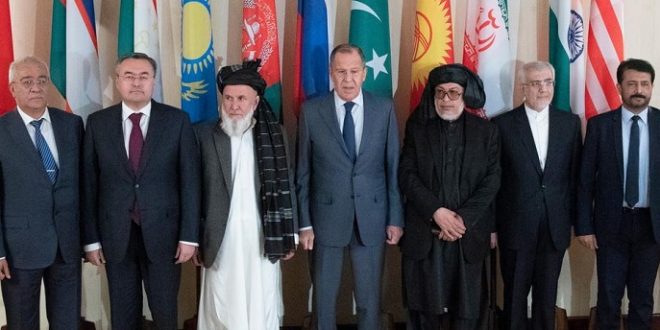AT News Report
KABUL: The Russian Federation’s Foreign Ministry on Monday reacted over revocation of intra-Afghan dialogue slated for 19-21 April to be held in Doha, the capital city of Qatar, criticizing the Afghan government for it.
Preparation was on full-swing where 250-member Afghan delegation had already assigned to take part in Doha talks with Taliban, but on April 18, the government said the meeting has been revoked due to disagreement over the list.
The Qatari government and Taliban group rejected meeting with fat Afghan delegation. Taliban said it is a formal meeting in a gulf country not a wedding party in one of Kabul hotels with hundreds delegation.
“We regret this decision of the organisers because this intra-Afghan format has proved to be the most promising communications channel between various political forces in Afghanistan, including the current Government and representatives of the armed opposition represented by the Taliban,” Maria Zakharova, a spokesperson for Russia’s Foreign Ministry.
“I would like to remind you that the first meeting of the intra-Afghan dialogue took place in Moscow on February 5-6, and that it was quite successful. During the meeting, without any external interference, prominent Afghan politicians and Taliban representatives initiated a dialogue about the future shape of the post-conflict Afghanistan,” she said, adding, “The abolition of such a dialogue can have negative consequences for the large-scale intra-Afghan peace process.”
“We consider the reason for the disruption of the Doha meeting to be the unconstructive position of the current leaders of Afghanistan, which sent a delegation to Qatar that a priori did not fit in the format of the event and caused discontent among many participants, including the main opponents, the Taliban,” she added.
“We believe that dictating the terms of holding the intra-Afghan meeting does not correspond to the statements by the current Afghan Government about its intention to launch a constructive conversation for the sake of the future of Afghanistan,” she furthered.
“We hope that Afghans will eventually manage to resolve the difficulties themselves and return to the dialogue that may prove to be seminal for their country.”
 Afghanistan Times
Afghanistan Times




